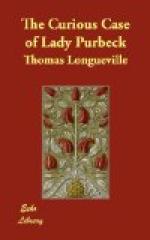John Villiers, alias Danvers, alias Wright, in addition to the title of Viscount Purbeck, assumed that of Earl of Buckingham, the reversion of which had been secured by the first Earl and Duke to his brother and his heirs, in the case of his own direct heirs failing. This self-styled Earl squandered his fortune in a life of debauchery, and then married the daughter of a clergyman, a widow with a large jointure but about as dissolute in character as himself, which is saying much. He left no sons.
Such claims as there were to the titles of Purbeck and Buckingham then lay with the Rev. George Villiers, Rector of Chalgrove, in Oxfordshire. He was the son of Edward, the second son of the boy christened Robert Wright. In the year 1723, on the death of his cousin, the so-called Earl of Buckingham, this clergyman put in a claim to the titles of Earl of Buckingham and Viscount Purbeck; but, unlike his cousin, he does not appear to have ever “lorded” himself.
This cleric left a son named George, who also became a parson, and Vicar of Frodsham in Cheshire. Efforts were made in his youth to obtain for him a summons to the House of Lords; but, in addition to the doubtful character of his claims, he was no persona grata to the King, as he was known to be an ardent Jacobite. As Burke says: “Republicans during the reign of the Stuarts—Jacobites during the reign of the Guelphs—this unfortunate family seems always to have had hold of the wrong end of the stick.” As a rule, they appear to have held that end of it, but certainly it is a rule to which George Villiers, first Duke of Buckingham, was a remarkable exception.
The Rev. George Villiers, who still owned property which had been settled by Sir Edward Coke on his daughter, Lady Purbeck, died without issue, in 1774, and his brother died a bachelor. The male line of Villiers, alias Danvers, alias Wright, then expired. We hear no more of any claims to the Purbeck peerage; henceforward the title which stands at the head of this story was no longer to have any place in living interests. At this point, let us also take leave of it; and the author hopes that his readers, if ever reminded of this book by the mention of Lady Purbeck, may not exclaim in the words of a character in Macbeth:—“The devil himself could not pronounce a title more hateful to mine ear.”
FOOTNOTES:
[101] Coles’ MSS., Vol. XXXIII., p. 17.
[102] He married a daughter of Sir William Slingsby of Kippax, Yorkshire.
[103] Burke’s Extinct and Dormant Peerages.
[104] The authorities for most of what follows are The Historical MSS. Commission, Ninth Report, Part II., p. 58; MSS. of the House of Lords, 30th April, 5th May, and 3rd June, 1675, 14th March, 16th June, and 9th July, 1678, and Burke’s Extinct and Dormant Peerages.
[105] MSS. of the House of Lords, 228, 30th April, 1675.




